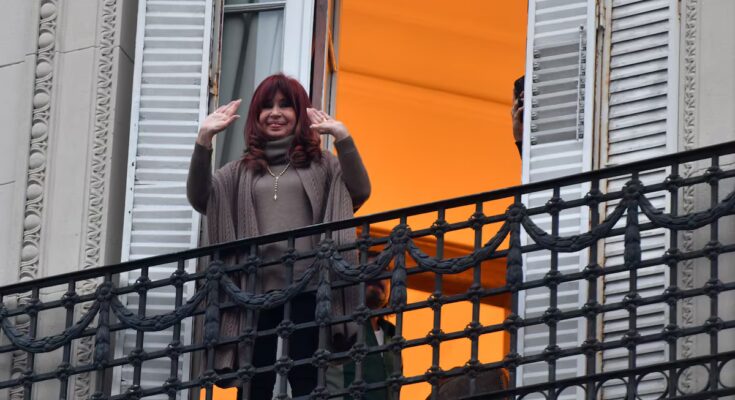Argentina’s justice system has limited the number of visits former president Cristina Kirchner can receive while she is serving a corruption sentence under house arrest. The decision was announced Wednesday, 48 hours after the former president met with nine economists from his department. In a corner of the Constitución neighborhood of Buenos Aires, the site has become a pilgrimage center for Peronist leaders and militants seeking to build an alternative opposition to Javier Milei’s government.
The measure was decided by federal judge Jorge Gorini, a member of the court that sentenced Kirchner to six years in prison for embezzlement of funds for public works, in the so-called case Roads. Since Kirchner was arrested last June, only family members, lawyers, doctors and custodians, all listed on a court-accepted list, have been allowed into her home. Any other person must seek prior permission from the court.
Now the judge has established that these extraordinary visits must “have a maximum duration of two hours”, “can be granted up to twice a week” and “cannot exceed the limit of three people present on each occasion”, specifies the sentence. Gorini insisted that the authorization to enter the house in via San José 1111 must be informed and authorized “for security reasons inherent to the house arrest regime, but without neglecting issues inherent to the nature of the criminal sanction that motivates the imprisonment”.
The tightening of the regime was a clear response to Kirchner’s meeting last Monday with a group of economists. Kirchner and his lawyers argued that he had complied with the required judicial authorization. But the judge maintained that “the visit of the nine people who entered the house was not requested in order to be able to all be present at the same time, nor to participate in a collective meeting”. In its resolution it is argued that “the concomitant presence of such a large group of people exceeds the terms of the requested authorization”.
It’s not the photo… it’s the stupid Economy.
The media bestiary has launched the attack once again. The reason? A photo of me, in San José 1111, together with nine young economists who, representing more than 80 professionals, presented me with considerations and proposals on a… pic.twitter.com/taPtEeJAjU— Cristina Kirchner (@CFKArgentina) November 19, 2025
Kirchner rejected the judge’s decision and attributed it to the confluence of the interests of the ultra government, the judiciary and the media. “Were the economists not authorized? Yes, of course they were authorized. I do not receive anyone without prior authorization from the court,” the former president wrote on his social networks and reposted photos of previous meetings with other groups of people.
For Kirchner, “what has really annoyed the media bestiary, its economic masters and the Milei government… is that we are talking about a national economic model of productive and federal growth for the 21st century in an Argentina that, from December 10, 2023 to today and under Milei’s government and policies, does not stop destroying companies and jobs.”



